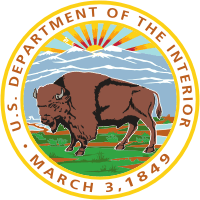Date: May 21, 2018
Contact: Interior_Press@ios.
Secretary Zinke Proposes Expansion of Hunting and Fishing Opportunities at 30 of America’s National Wildlife Refuges
PLEASE NOTE: The Fish & Wildlife Service will seek comments from the public on the proposed rule for 30 days, beginning with publication in the Federal Register in coming days. The notice will be available at www.regulations.gov, docket no. FWS-HQ-NWRS-2018-0020, and will include details on how to submit your comments. An interim copy of the proposed rule is now available at https://www.fws.gov/home/
WASHINGTON – Continuing his efforts to increase access to public lands, U.S. Secretary of the Interior Ryan Zinke today announced a proposal to open more than 248,000 acres to new or expanded hunting and fishing opportunities at 30 national wildlife refuges.
Opportunities include places like Hackmatack National Wildlife Refuge in Illinois and Wisconsin, and deer hunting in Philadelphia at John Heinz National Wildlife Refuge being proposed for the first time. The proposal also outlines expanded hunting and fishing opportunities at 136 national wildlife refuges. If finalized, this would bring the number of units of the National Wildlife Refuge System where the public may hunt to 377, and the number where fishing would be permitted to 312.
“As stewards of our public lands, Interior is committed to opening access wherever possible for hunting and fishing so that more families have the opportunity to pass down this American heritage,” Secretary Zinke said. “These 30 refuges will provide incredible opportunities for American sportsmen and women across the country to access the land and connect with wildlife.”
The U.S. Fish and Wildlife Service’s (Service) proposal would open more new acres to hunting and fishing than in the past and takes steps to simplify regulations to more closely match state hunting and fishing regulations. The changes would be implemented in time for the upcoming 2018-2019 hunting seasons.
Hunting, fishing and other outdoor activities contributed more than $156 billion in economic activity in communities across the United States in 2016 according to the Service’s National Survey of Fishing, Hunting and Wildlife-Associated Recreation, published every five years. More than 101 million Americans – 40 percent of the U.S. population 16 and older – pursue wildlife-related recreation, such as hunting, fishing and birding.
“Ensuring public lands are open for multiple uses supports local economies and provides important opportunities for recreation. Further, this proposal means that families and individuals across our nation will be better able to participate in our nation’s tradition of hunting and fishing. We appreciate Secretary Zinke and the Interior Department for advancing this priority, and we will continue to work to improve access to public lands for our sportsmen,” said Senator John Hoeven.
“Public lands should be open for the public to enjoy,” said Chairman Rob Bishop of Utah. “The Department of the Interior’s latest decision to expand acreage and access for hunting and fishing on wildlife refuges was the right move. Secretary Zinke’s decision will help our economy grow and enable those who hunt and fish to spend more time catching game and less time caught in red tape.”
“North Dakota is a sportsman’s paradise. The decision to expand access to public lands by opening more than 248,000 acres across the nation to hunting and fishing will provide new economic opportunities for local communities as well as open up new areas for anglers and hunters,” said Congressman Kevin Cramer. “For the first time, the J. Clark Salyer and Lostwood National Wildlife Refuges will be open to moose hunting. I commend the Secretary’s decision and look forward to working with the department.”
“Hunters, anglers and shooting sports enthusiasts play a crucial role in funding the management and conservation of North America’s wildlife,” said Service Principal Deputy Director Greg Sheehan. “We are providing sportsmen and women with more access to our national wildlife refuges and streamlining regulations to more closely align with our state partners. And that’s good news for our customers.”
The Service manages hunting and fishing programs to ensure sustainable wildlife populations while also offering other traditional wildlife-dependent recreation on public lands, such as wildlife watching and photography. The Refuge System is an unparalleled network of 566 national wildlife refuges and 38 wetland management districts. There is a national wildlife refuge within an hour’s drive of most major metropolitan areas.
“The proposed expansion of hunting and fishing opportunities through working partnership with the states is a demonstration of Secretary Zinke’s commitment to our nation’s outdoor heritage and the conservation community,” said Virgil Moore, President of the Association of the Fish and Wildlife Agencies and Director of the Idaho Department of Fish and Game. “These efforts reaffirm the tremendous value of quality wildlife habitat and outdoor recreational opportunities, including hunting and fishing, in connecting millions of Americans to the outdoors.”
“We applaud Secretary Zinke and the Fish and Wildlife Service for their continued commitment to increasing opportunities for hunting and fishing within the National Wildlife Refuge System,” said Congressional Sportsmen’s Foundation President Jeff Crane. “We look forward to continuing to work with the Department of Interior on increasing access for sportsmen and women.”
Hunting and/or fishing will expand or be opened on the following refuges:
Arkansas
- Felsenthal National Wildlife Refuge: Expand existing migratory game bird, upland game and big game hunting.
California
- San Pablo Bay National Wildlife Refuge: Expand existing migratory game bird hunting, and open sport fishing for the first time.
Florida
- Lake Woodruff National Wildlife Refuge: Open wild turkey hunting for the first time.
Illinois
- Cypress Creek National Wildlife Refuge: Expand existing migratory game bird, upland game and big game hunting.
Illinois and Missouri
- Great River National Wildlife Refuge: Expand existing migratory game bird, upland game and big game hunting.
Illinois and Wisconsin
- Hackmatack National Wildlife Refuge: Open migratory game bird, upland game and big game hunting to all legal species in the State of Illinois.
Indiana
- Patoka River National Wildlife Refuge: Expand existing migratory game bird, upland game, big game hunting and sport fishing
Maine
- Moosehorn National Wildlife Refuge: Expand existing migratory game bird, upland game and big game hunting.
- Rachel Carson National Wildlife Refuge: Expand existing white-tailed deer and wild turkey hunting.
Maine and New Hampshire
- Umbagog National Wildlife Refuge: Open wild turkey hunting for the first time, and expand existing migratory game bird, upland game and big game hunting.
Maryland
- Blackwater National Wildlife Refuge: Expand existing migratory game bird and big game hunting.
- Patuxent Research Refuge: Expand existing white-tailed deer and wild turkey hunting.
Michigan
- Shiawassee National Wildlife Refuge: Open hunting of certain migratory bird, small game, and furbearers, and expand existing migratory game bird and big game hunting.
Minnesota
- Glacial Ridge National Wildlife Refuge: Open certain gamebird and small mammal hunting for the first time, and expand existing migratory game bird, upland game and big game hunting.
Montana
- Charles M. Russell National Wildlife Refuge: Expand existing big game hunting.
- Swan River National Wildlife Refuge: Open big game hunting for the first time.
New Jersey
- Edwin B. Forsythe National Wildlife Refuge: Open wild turkey and squirrel hunting for the first time, and expand existing migratory game bird and big game hunting.
New Jersey and New York
- Wallkill River National Wildlife Refuge: Expand existing migratory game bird hunting and sport fishing.
New Mexico
- Sevilleta National Wildlife Refuge: Open Eurasian-collared dove and Gambel’s quail hunting, and expand existing migratory game bird hunting.
North Dakota
- J. Clark Salyer National Wildlife Refuge: Open moose hunting for the first time.
- Lostwood National Wildlife Refuge: Open moose hunting for the first time.
Ohio
- Cedar Point National Wildlife Refuge: Open white-tailed deer hunting for the first time.
- Ottawa National Wildlife Refuge: Open hunting of certain gamebirds, small mammals and furbearers for the first time, and expand existing migratory game bird and big game hunting.
Oregon
- Cold Springs National Wildlife Refuge: Expand existing migratory game bird, upland game and big game hunting.
- Upper Klamath National Wildlife Refuge: Expand existing migratory game bird hunting.
- William L. Finley National Wildlife Refuge: Expand existing sport fishing.
Pennsylvania
- Cherry Valley National Wildlife Refuge: Expand existing migratory game bird, upland game and big game hunting.
- John Heinz National Wildlife Refuge at Tinicum: Open white-tailed deer hunting for the first time.
Utah
- Bear River Migratory Bird Refuge: Expand existing migratory game bird and upland game hunting.
Wisconsin
- Trempealeau National Wildlife Refuge: Open hunting of certain gamebirds, small mammals and furbearers for the first time, and expand existing migratory game bird and big game hunting.
The Service will seek comments from the public on the proposed rule for 30 days, beginning with publication in the Federal Register in coming days. The notice will be available at www.regulations.gov, docket no. FWS-HQ-NWRS-2018-0020, and will include details on how to submit your comments. An interim copy of the proposed rule is now available at https://www.fws.gov/home/
More than 53 million Americans visit refuges every year. National wildlife refuges provide vital habitat for thousands of species and access to world-class recreation, from fishing, hunting and boating to nature watching, photography and environmental education. In doing so, they support regional economies to the tune of $2.4 billion dollars per year and support more than 35,000 jobs.
Under the National Wildlife Refuge System Improvement Act of 1997, the Service permits hunting and fishing along with four other types of wildlife-dependent recreation, including wildlife photography, environmental education, wildlife observation and interpretation, when they are compatible with an individual refuge’s purpose and mission. Hunting, within specified limits, is currently permitted on 337 wildlife refuges and 37 wetland management districts. Fishing is currently permitted on 277 wildlife refuges and 34 wetland management districts.
###


